ROME – Jewish Rhodes, the longest journey, and Sami’s memories

The journey that began on July 23, 1944, from Rhodes and Kos in Greece towards Auschwitz-Birkenau, was the longest deportation ever undertaken by Nazis. It was also one of the most devastating, marking the disappearance of an entire world. That day spelled the end for the once-flourishing, century-old Jewish community.
The exhibition Il viaggio più lungo. La deportazione ad Auschwitz degli ebrei di Rodi e Kos (The longest journey. The Jewish deportation from Rhodes and Kos) to Auschwitz, which opened on Friday, September 20, at the Museum of the Shoah Foundation in Rome, retraces this tragic history through panels, historical photographs, and unpublished video interviews recorded by the CDEC Foundation for its Memory Archive. The exhibition is curated by historian Marcello Pezzetti.
“We spoke Ladino among ourselves,” said 93-year-old Sami Modiano, a Holocaust survivor and the last living witness of that world, during the inauguration. Recalling his childhood in Rhodes, he became emotional as he looked at a photograph of himself as an elementary school student. Back then, the future seemed bright for the Jewish inhabitants of the Island of Roses, which Italy had taken control of in 1912. “When I was told that I had been expelled from school because of the racist laws, I broke down crying,” Sami shared. “The teacher dried my tears and said: ‘Go home, they’ll explain it to you there’. My studies stopped at the third grade: it was devasting, and I still haven’t come to terms with it.”
The deportation of the Jews of Rhodes “is a harrowing story,” said Rome’s Chief Rabbi Riccardo Di Segni. “At Auschwitz-Birkenau, a centuries-old, if not millennia-old, chapter of history came to a close.” The Italian rule in the Dodecanese initially offered a different outlook, he noted recalling the founding of a Rabbinical College, led by Rabbis Riccardo Pacifici and David Prato.
“Knowing the history of each persecuted community means, now more than ever, safeguarding humanity from any form of oblivion and indifference,” remarked Mario Venezia, president of the Museum of the Shoah Foundation, inaugurating the exhibition. Antonella Di Castro, vice-president of the Jewish Community of Rome, expressed gratitude to Modiano on behalf of Roman Jews “for his boundless ability to rise again, a testament to a cathartic strength that we must look to in order to face the future with determined hope. Christina Karagiorga, deputy head of the Greek Embassy, also emphasized, “Preserving historical memory is a duty.”
Photo: Marcello Pezzetti (L) and Sami Modiano (R) introduce the exhibition to the public.
